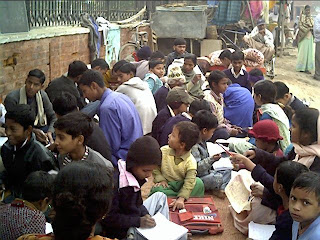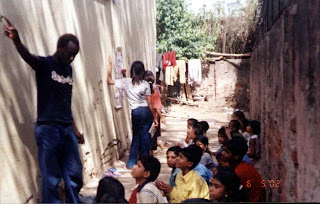Can’t read, Can’t write, Can’t count. The Empty promise of Primary Education in India is the topic selected by a leading weekly to mark the 66th Independence Day of India. Haven’t read all of it yet as I want to do so slowly and with responsibility but I am grateful to this weekly with a conscience to have chosen this not so TRP worthy subject to mark an important day! After 66 years we as nation have not understood that is education and EDUCATION alone that can change India. Just ask yourself what makes the real difference between you and the woman who cleans your house. The answer is simple: your ability to read and write and speak good English and count of course! Your savoir faire, your manners, your behaviour are all bye products of your education. The first article poses the question that begs to be asked: in spite of ‘adequate’ funding, statistics are frightening. The Education imparted is state run schools is so bad that five years from now over half the children in rural India will be in private schools. Enrolling children is not enough it is what and how they are taught that matters. It is time posits the article to stop patting ourselves on the back for statistics that mean nothing, and admit that there are systemic failures that need to be addressed with honesty.
I remember telling a bunch of Lohar (gypsy blacksmith) kids that they had to dream big, and if they did they would be able to fulfil their dream. In those days we taught them on an empty piece of land behind their roadside camp and amongst the kids was Sanjay (wearing a yellow shirt in the pic). I do not know what his dream was that day but let me tell you he made it big. After a stint as a project why teacher he found his wings (with a little help) and now walks the ramp for high fashion designers in India and Paris. What he got from us is education of course, but also the chance to meet people from other countries, to gain confidence, speak English and dream! This memory came back to me when I read a line of the article. What do we tell a child who dreams of being a pilot and knows that school is the only way to achieve that dream but hates school because she is violently punished whenever she makes a mistake by her overworked, overstressed teacher? The answer is simply I do not know! And the author goes on to say, and I second him fully: We are creating generations of children aching with aspiration but left unequipped by their schooling to realise that aspiration. Imagine the frustration. There is a time bomb ticking and God help us when it explodes! It is time we all woke up to the reality and did something. maybe the first thing would be to read the articles in this issue.
For the past 13 years we have been working in the field, trying to reach out to as many children as possible and ensuring that their years in school are not wasted. Let me tell you you do not need large amounts of money or super skills or even infrastructure to make a difference. In the past 13 years we have taught in a pig park, in a reclaimed garbage dump (we still do), between two houses as you can see in the picture and in every space possible. Our teachers do not have teaching degrees. Some are even drop outs not because they lacked capacity but often because of early marriages. Some of our teachers are pwhy alumni. What they lack in certificates they make up in large measure in motivation, understanding and passion for their work. All that needs to be said is that in the past 12 years no child has failed any examination and many pwhy children top their respective classes. What is sad is that my own peers do not reach out and help us with the funds we so need to carry on and if possible widen our outreach.
Let us be real. Children cannot wait for things to fall in place and be perfect. Children are growing by the minute and for them time is of the essence. The magazine is replete with articles about people doing a great job, but that is not the answer. I too could claim doing a great job but is a drop in the ocean. The response of the powers that me is wishy washy as usual. You can judge for yourself. You can also judge for yourself how behind our children are: 50 percent of kids between the age of 6 and 14 in government schools couldn’t read, write or do arithmetic at any reasonable level. Frightening isn’t it? One of the solutions proposed is to define small concrete goals and meet them. Others feel it is important to use the money sensibly and according to the needs. I laughed and cried at the same time when I read these lines: My favourite is a school without a building that was asked to buy fire safety equipment with grant money. But, of course, there was no building, so they bought the equipment and asked the shopkeeper to keep it until such time they were able to erect one. I am particularly in sync with this view as I have always asked my donors to trust me and leave it to us to decide how the money is best spent.
All the above sounds logical, but absurd when we realise that we are debating this after 66 years of Independence. The magazine has a series of articles on what philanthropists are doing, or what individuals are organisations are doing. Every one is worth a read. But the problem is huge and such voices and deeds are drops in the ocean. There are also articles highlighting the problems faced by one and all: children, parents and teachers. Each one of them are valid and show that our whole education system needs to be re-looked at.
There are some issues that I have often highlighted and that I would like to reiterate. One is that we must stop the farce of retaining 33% as a pass percentage for any examination. This sets the course of mediocrity and shuts many doors for children who would have spend or should I say wasted 12 years in school. The next one is to change the approach the State seems to have taken. Instead of privatising education and ‘reserving’ some seats for ‘poor’ child, seats often hijacked by the middle class as the poor do not have the knowledge and often documents required to secure a place for their children, the State should take on its constitutional responsibility and make every state run school a centre for excellence so that it attracts a mix of social profiles. And last but not the least, we should not only accept but encourage that our driver’s kid shares a bench with ours!




